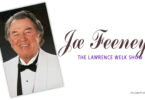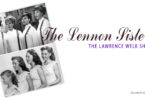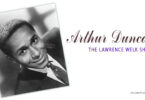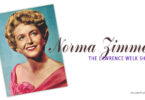Lawrence Welk was born in 1903 in Strasburg, North Dakota, the sixth of eight children. His parents were Ludwig Welk and Christiana Schwahn. The family was Roman Catholic, and Lawrence’s parents were German immigrants from Odesa, (which was in Russia then but is now in Ukraine). His parents immigrated to the United States in 1892.
The Welk family ended up in Ukraine in 1808, when Lawrence’s paternal great-great-grandparents, Moritz and Magdalena Welk, moved there from the German-speaking area of Alsace-Lorraine. The former governor of Montana, Brian Schweitzer, was a first cousin once removed of Lawrence’s. His mom and Schweitzer’s paternal grandmother were sisters.
The Welk family lived in North Dakota on a homestead that is now a tourist attraction. The first year they were in North Dakota, they spent it living inside an upturned wagon covered in sod to keep warm. In this wagon, they spent the freezing North Dakota winter. The family added more children after immigrating and earned a living as farmers on the frigid North Dakota plains.
The farming life in North Dakota was not easy on in those times. As such, young Lawrence dropped out of elementary school in fourth grade and worked on the family farm full-time.
Despite these hardships, Lawrence loved music and knew from a young age that he wanted to pursue a career in it. Lawrence extracted an agreement from his dad whereby his dad would by him a $400 mail-order accordion (worth $5,411 in today’s money). In exchange for the expensive accordion, Lawrence promised his dad that he would work on the family farm until he was twenty-one years old. If he made any money somewhere other than the farm during that time, that money would go to the family. After he was twenty-one, he was free to do as he pleased and to keep any money he made.
Interestingly, because Lawrence grew up in a German household, he did not learn to speak English until he was twenty-one years old, even though he was born in the United States. Lawrence was never completely comfortable speaking English in public. This is also why he always had a clear German accent when he was in show business. Also, though he achieved worldwide fame, Lawrence was a particularly iconic figure in the German-Russian community of the northern Great Plains region of the United States, as his success was considered to be the American dream personified amongst his Germanic peers.
Lawrence did not wait to embark on his music career. On his twenty-first birthday, his promise to his dad was fulfilled, and Lawrence left the farm to pursue his dream of a music career. He began by leading bands in North and South Dakota. He also led the station band at the WNAX radio station in Yankton, South Dakota.
Lawrence put together what would become his band, the Lawrence Welk Orchestra, while he was in charge of local and regional bands. The band was an instant success and quickly got a gig playing on a daily radio show. This gig was from 1927 to 1936. This gig led to a plethora of well-paying gigs across the midwestern states. Also, in 1927, Lawrence graduated from the MacPhail School of Music in Minneapolis, Minnesota.
In the 1930s, Lawrence traveled with his band, specializing in dance and “sweet” music. Sweet music was a subgenre of jazz. It was different from traditional jazz, which was rhythmic and loud at the time, because it had light, melodic tunes. The band initially traveled from gig to gig by car, as they could not afford hotel rooms. They slept in their cars and changed clothes in them.
While traveling with his band, Lawrence became the king of “champagne music.” This moniker was given to his music after the band played at the William Penn Hotel in Pittsburgh, Pennsylvania. A dancer at that gig referred to the band’s music as “light and bubbly,” like champagne. This hotel claimed to be where Lawrence used a bubble machine with his band for the first time. The machine was a prop the establishment owned that was left over from a movie premier held there in the 1920s.
Lawrence once spoke of his band’s music style:
“We still play music with the champagne style, which means light and rhythmic. We place the stress on melody; the chords are played pretty much the way the composer wrote them. We play with a steady beat so dancers can follow it.”
The champagne music became Lawrence’s hallmark, and his fame in this area of music led to him being given his television show, which aired for decades. Lawrence is a beloved entertainer for generations of people.
As for his personal life, Lawrence married in 1931 to Fern Renner, with whom he had three children and, eventually, many, many grandchildren and great-grandchildren. Lawrence and Fern were married for sixty-one years until Lawrence crossed to the other side in 1992.
Lawrence was a shrewd businessman, as well as a world-class musician. In addition to investing in a large amount of valuable real estate, he invented a few things for which he obtained US design patents. These inventions were:
A musically-themed restaurant menu
An accordion-themed ashtray
Two different designs for an accordion-themed restaurant serving trays
Lawrence was a Roman Catholic and went to mass daily. He was a member of the Benevolent and Protective Order of Elks.
Lawrence retired in 1982 from touring with his band and his TV show. Though he retired, he allowed PBS to keep airing the show in reruns. The individual episodes were packaged for syndication. He produced and starred in two of his show’s Christmas specials in 1984 and 1985. Also, in a restaurant and club he owned in Escondido, California, Lawrence filmed new lead-ins to reruns of The Lawrence Welk Show. Other regular performers on his show filmed their lead-ins over the years, and the show still airs in reruns with these lead-ins on PBS today.
Lawrence Welk crossed to the other side of pneumonia in 1992 and was buried in the Holy Cross Cemetery in Culver City, California. He was eighty-nine years old and was surrounded by his family and friends in the apartment he shared with his wife when he crossed. He is still beloved today by millions around the world.




